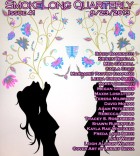So first we need to address the ass-smothering monkey. There’s no getting around him. So let’s talk about him. Specifically, let’s talk about your use of tragedy as a means of advancing the story.
I’m awfully glad you like that monkey, Boone, though I have mixed feelings about it. I know that during the Depression plenty of poker games ended up with a chicken or pig in the pot, but the monkey comes from something that happened to me one summer when I was three. In brief: there was a portable cage, the parking lot of a Dixie Queen, inattentive adults, and a monkey that whipped its tail around my neck and whacked my head against the bars of its cage until I gave up my ice cream. I didn’t give it up mildly and still have a mark under one eyebrow. But you make the true writerly point—tragedy and conflict (even when comic) always forward a story. Perfect happiness, sadly, does nothing for a story. So I like the monkey, too. And kind of hate it.
So Howt Belkin isn’t tragic, at least not in any notable way. But he’s the one Ida remembers which feels like a pretty amazing victory under the circumstances. What was behind the decision not just to let him live, but to let him be the symbol for peace in Ida’s life.
Love this question, since it gets at why I wrote the story to begin with. I come from a family of storytellers (perhaps a nice way of saying fanatical gossips) and it struck me recently that a lot of the stories we tell and pass down are really the histories of assholes. Assholes are active and distinctive, which makes them interesting to a storyteller. In this story I wanted to think about how to highlight a good man, a kind and gentle man, an anti-hero with no plot attached to him, no good story, and yet he’s the one remembered 84 years later. I do like to think it’s possible to remember an act of kindness or warmth long after even the best of stories has faded from memory.
Of course, this story could have been set in Maine or Arizona. But it isn’t. It’s a southern story and that doesn’t feel like a coincidence. Can you talk a bit about the region’s influence on the story and for that matter on the Brothers Belkin.
As you say, it’s a southern story. I can’t imagine the story being set anywhere else but East Tennessee (which I never name), mostly because it’s based on the people and places and actions I have known there. It’s a commonplace that southern fiction writers have affection for the grotesque and dark comedy, though I’d argue that the Brothers Belkin are perfectly familiar characters where I grew up and not particularly grotesque ones. Or even unusual. Still, it’s true that I meant for the piece to be darkly comic and in that way I suppose it’s of a piece with other writing from the south. I get anxious when certain kinds of writing get categorized as “regional writing” and other writing is not considered regional, as though New York City isn’t a region but a universal geography. Not that you’re making me anxious, Boone.
Which leads us to you. Can you tell us a bit about yourself? Where you’re from. What else have you written? Do you have a writing process?
What are you working on now? Plug all work, past, present and future.
I grew up in a small town in East Tennessee, Rogersville. It’s the second oldest town in Tennessee, or else we’re in competition with a Middle Tennessee town to be the second oldest. I forget, but remember it being a matter of no little importance when I was growing up. I’ve written a couple of books of short stories, and I’m working on a novel right now. I’ve found that flash fiction makes for a nice antidote to what can seem like the unending saga of writing a novel. Finally you can get out of that fatter world and write something that has nothing to do with those characters or that place. I think it’s why I have a great deal of affection for every flash fiction I’ve ever written. Just the wonderful relief of it. The intensity of it. The in and out impact of it. The way you remember exactly how you felt when you were writing it. You just don’t have that kind of emotional memory with the longer stuff. Flash fiction is a wonder.



 The SmokeLong Grand Micro Contest (The Mikey) is now an annual competition celebrating and compensating the best micro fiction and nonfiction online.
The SmokeLong Grand Micro Contest (The Mikey) is now an annual competition celebrating and compensating the best micro fiction and nonfiction online.